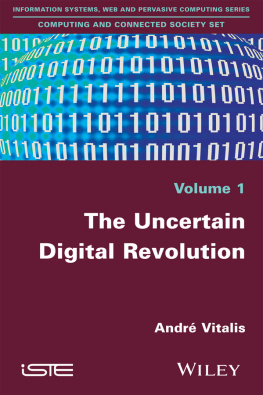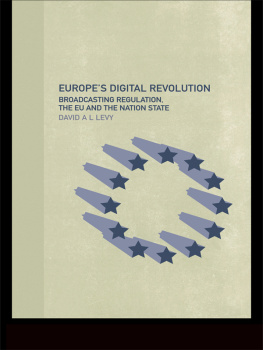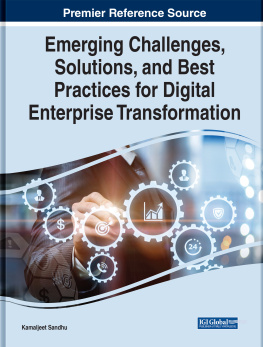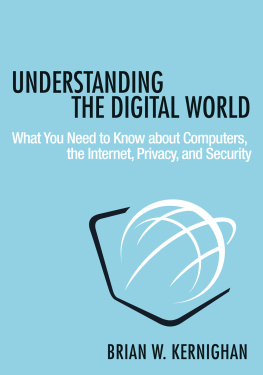WILEY END USER LICENSE AGREEMENT
Go to www.wiley.com/go/eula to access Wileys ebook EULA.

Table of Contents
Guide
Pages
Computing and Connected Society Set
coordinated by
Dominique Carr and Genevive Vidal
Volume 1
The Uncertain Digital Revolution
Andr Vitalis
First published 2016 in Great Britain and the United States by ISTE Ltd and John Wiley & Sons, Inc.
Apart from any fair dealing for the purposes of research or private study, or criticism or review, as permitted under the Copyright, Designs and Patents Act 1988, this publication may only be reproduced, stored or transmitted, in any form or by any means, with the prior permission in writing of the publishers, or in the case of reprographic reproduction in accordance with the terms and licenses issued by the CLA. Enquiries concerning reproduction outside these terms should be sent to the publishers at the undermentioned address:
ISTE Ltd
27-37 St Georges Road
London SW19 4EU
UK
www.iste.co.uk
John Wiley & Sons, Inc.
111 River Street
Hoboken, NJ 07030
USA
www.wiley.com
ISTE Ltd 2016
The rights of Andr Vitalis to be identified as the author of this work have been asserted by him in accordance with the Copyright, Designs and Patents Act 1988.
Library of Congress Control Number: 2016947849
British Library Cataloguing-in-Publication Data
A CIP record for this book is available from the British Library
ISBN 978-1-78630-086-7
Introduction
When one is uncertain of ones destination, it is better to be certain of where one comes from.
Proverb
The expression digital revolution entered public consciousness at the end of the 2000s when millions of people started using smartphones in order to connect to the Internet. Smart devices, which are merely the size of a deck of cards, appeared after the large computers of the 1960s and the smaller laptops of the 1980s and have enabled a great proportion of the population to gain access to the digital world, transferring information both automatically and instantaneously.
The vast majority of discussion surrounding this technological revolution tends to liken it to the Industrial Revolution of our times, a revolution that constitutes a new stage of technological progress while presenting major changes in every realm of experience. Difference in opinion arises on evaluation of the effects of such changes. For example, those who firmly believe in the benefits of the phenomenon do not tend to hold negative opinions about the changes that constantly occur within it. By allowing the individual to access an abundant amount of varied information, technology furthers crucial progress in areas such as general knowledge, education, health and work while guiding us toward a future that is more ecological, more democratic and with increased sustainability prospects.
If we were to perceive technological advancement in an ambivalent light, the effects produced by it would be remarkably contrastive. Along with the benefits come negative aspects such as increased surveillance, loss of jobs and dependence on private companies that monopolize the market (Google, Apple, Facebook, Amazon (GAFA)). Those able to critically and objectively analyze believe that this revolution conceals a predatory form of capitalism that impedes the liberating possibilities inherent to digital technology. A more radical yet informed technological critic would be quick to question a technology that does nothing but extend technical and technoscientific movements, which started years before, insisting that the system is far from revolutionary.
The ambiguous digital revolution was preceded by 50 years of digitalization in society, marked by incessant technical innovations and increasing numbers of applications. Nothing has disturbed this continual development, considered a guarantee of economic and social progress, despite the fact that efforts were made to expose disadvantages, such as the threat to personal privacy. In France, a number of organizations such as CREIS, CECIL and Terminal magazine have been skeptical from the beginning, analyzing the situation, discussing it critically and introducing modes to educate people about what they call Information Technology and Society. As expressed by a technological historian, since 1980, criticism about the surge of information technology has never halted despite always being rather insignificant [JAR 14].
This work, by taking a digital and social approach, will examine the great issues of contention that have appeared as information technology has advanced. Context will be considered in order to explore the ways in which such issues were created and when necessary, theoretical tables will be used to get a better grasp of the issue and its scope. A time frame of half a century, beyond the short-term details and developments, will serve to thoroughly trace the crucial questions that have been revealed, to separate the sustainable from the unsustainable, the essential from the unessential and the innovative from the unimaginative. The phenomenon of computerization has often gone down unexpected paths, different to what had been predicted or announced. Never was it predicted that a management and control tool would turn into a major tool of expression and communication in the space of a few years. In the same way, in spite of the irrevocable concerns and warnings that people attached to the idea of automating personal files, no one could have predicted the sheer extent of control operations undertaken by American intelligence services, facts that were laid bare because of Edward Snowden. By looking back in time, regardless of positive or negative opinions, we can scrutinize events of the past, or the concept of a a t, which was developed by Roland Barthes on his work surrounding photography. Of course, absolute objectivity will never be wholly possible, but the factual information collected has been proven, even if it has been acquired from sources with a particular stance, namely that of progress or, most commonly, that of the preservation of individual liberties. In this respect, particular attention has been given to the ever-changing status of personal data due to the fact that freedoms are dependent on the control or the lack of control that the individual does or does not dispose of when using technology. As Wolfgang Sofsky stated, respecting the private sphere is the foundation of freedom, and this freedom protects against any figure of power He who thinks that he has nothing to hide has already renounced their right to freedom [SOF 11].
Fifty years of digitalization has provoked or seriously contributed to four major social problems:
1) Problems regarding social control that became relevant on the creation of the first data banks in the 1960s.
2) Problems regarding public security that came to the surface in the middle of the 1990s and which following the 9/11 attacks continue to be of particular relevance.
3) Problems regarding communication and exchange due to the invention of the laptop in the 1980s and above all the Internet which arose in 1993.
4) Problems regarding private bodies that use personal data for economic benefit, a phenomenon that appeared in the 2000s.
Each of these problems acquired an American expression before entering the French vocabulary as well as that of other democratic countries around the world. This American supremacy arises from the vital role played by the United States throughout the period. To this day, Silicon Valley remains the main player in the digital revolution.











